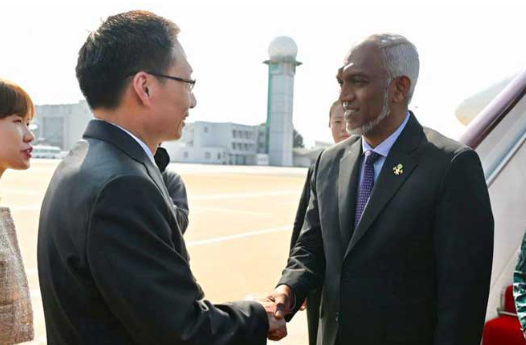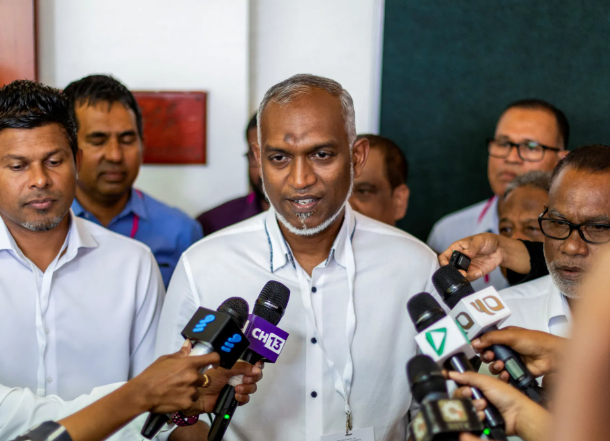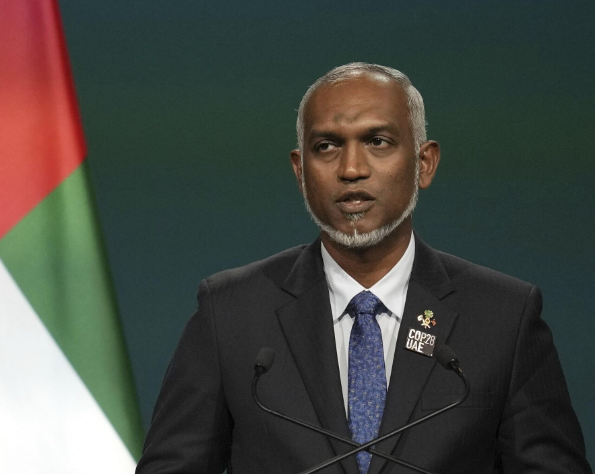
Maldives President Urges China to Boost Tourism Amidst Relations with India
Maldives President Urges China to Boost Tourism Amidst India Relations
Maldives President Mohamed Muizzu expressed the significance of China as a key ally and development partner during his five-day state visit to the country. In his address to the Maldives Business Forum in Fujian province, he emphasized the strong relationship between the two nations and urged China to further enhance its contribution to Maldives’ tourism sector amidst a diplomatic dispute involving derogatory remarks made by Maldivian ministers against India and Prime Minister Modi.
Highlighting China’s role as one of the Maldives’ “closest allies and development partners,” President Muizzu lauded the Belt and Road Initiative (BRI) projects initiated by Chinese President Xi Jinping in 2014. He credited the BRI for delivering substantial infrastructure projects that marked a significant chapter in Maldivian history.

Acknowledging China’s prominence as the primary market for Maldives before the COVID-19 pandemic, President Muizzu made a plea to intensify efforts to revive China’s status as their foremost market. As a tangible outcome of the visit, the two nations signed a USD 50 million project aimed at developing an integrated tourism zone in the Maldives.
The timing of this diplomatic exchange is crucial, considering the strained relations between the two countries due to derogatory comments made by Maldivian ministers following Prime Minister Modi’s visit to the Lakshadweep islands. In response, all three deputy ministers involved were suspended, and the Maldives Association of Tourism Industry (MATI) strongly condemned the remarks.
Known for his pro-China stance, President Muizzu highlighted his administration’s commitment to diversifying the Maldives’ economic base and ensuring economic security. Emphasizing the importance of the Free Trade Agreement (FTA) signed with China in December 2014, he described it as a symbol of the close commercial ties between the two nations.
“The FTA’s aim to boost bilateral trade and investments, especially increasing our export of fish products to China is a key priority for us through the FTA,” President Muizzu stated, underlining the significance of this agreement in promoting economic cooperation.

Seeking to further enhance economic collaboration, the president invited investments from Chinese companies for 11 projects presented at the Investment Forum. These projects encompassed critical initiatives such as the relocation of the Male Commercial Port to Thilafushi, the development of the Velana International Airport, and the construction of 15 additional airports.
President Muizzu’s visit to China, with its emphasis on economic diversification, tourism collaboration, and strengthening bilateral ties, reflects the ‘strategic approach to fostering partnerships and ensuring long-term economic stability.
President Muizzu’s speech underscored the commitment to economic diversification, with a specific focus on the quick implementation of the Free Trade Agreement (FTA) signed with China. The FTA is viewed as a pivotal instrument for fostering economic cooperation and boosting bilateral trade and investments between the Maldives and China.
“The FTA’s aim to boost bilateral trade and investments, especially increasing our export of fish products to China is a key priority for us through the FTA,” President Muizzu emphasized, highlighting the tangible benefits expected from this bilateral trade agreement.
As part of the ongoing efforts to solidify economic ties, President Muizzu sought Chinese investments for a range of projects presented at the Investment Forum. Among these projects, the relocation of the Male Commercial Port to Thilafushi holds strategic importance, aiming to enhance logistical capabilities and further integrate the Maldives into global trade networks.
Additionally, the Velana International Airport development project signifies a substantial step towards upgrading the country’s air infrastructure, catering to the growing demands of international tourism and trade. The ambitious plan to construct 15 more airports aligns with the ‘vision of becoming a regional hub for air travel and connectivity.
President Muizzu’s outreach to Chinese companies for investments in these projects not only reflects his administration’s proactiveness in securing economic partnerships but also highlights the mutual interests of both nations in fostering sustainable development and economic growth.
Beyond the economic realm, the President’s call for increased Chinese tourism to the holds strategic importance. The Maldives, renowned for its picturesque landscapes and vibrant marine life, has been a popular destination for Chinese tourists. President Muizzu’s request for China to intensify efforts in sending more tourists acknowledges the critical role tourism plays in the economy and aims to leverage the strong people-to-people ties between the two nations.
In the context of the diplomatic row involving derogatory remarks against India, President Muizzu’s diplomatic balancing act becomes apparent. While addressing concerns and taking actions against offending officials, he simultaneously emphasizes the strength of the relationship with China. This nuanced approach reflects the diplomatic strategy to maintain friendly ties with all key partners, navigating through complex regional dynamics.
In conclusion, President Muizzu’s state visit to China is a multifaceted diplomatic and economic endeavor. The emphasis on economic diversification, strengthened trade relations through the FTA, infrastructure development, and tourism collaboration all contribute to the ‘strategic vision for sustained economic growth and stability. The delicate diplomatic maneuvering amid regional tensions further underscores the Maldives’ commitment to maintaining a harmonious balance in its international relationships.
For the latest updates-click here.


